Top 8 Best Employee Experience Platform Solutions of 2025 (+Tips on Choosing the Right One)
When choosing an employee experience platform, you can’t go wrong with a solution that offers a particularly recherché selection of features. Here is the complete guide to help you choose the right employee experience platform.
On this page
If you want to increase your annual revenues, see your stock prices skyrocket, and your employee attrition plateau, you need it. But don’t just settle for ‘anything.’
An all-in-one employee experience platform can help you curate the best experiences for your workforce, from onboarding to exit.
Adobe moved to a digital credentialing platform that uses advanced analytics to identify employee interests and made changes based on their feedback. They monitored the employees’ sentiments and made company-wide changes to offer their employees better experiences, including:
- 📅 20 additional paid days off for employees affected by natural disasters and pandemics
- 🕑 flexible work schedules to fit around caregivers and childcare routines
- 💸 increased wellness reimbursement of $600
- ☕ bi-weekly coffee break series
Adobe’s example proves two important points:
- Employees look beyond nominal gifts. They want phenomenal experiences that show the company ‘cares for them.’
- The right tool/platform plays a vital role in customizing these experiences for a multi-generational workforce.
Key employee experience platform evaluation checklist
What’s the first thing to do when you want to buy a good laptop? Research the different laptop brands and create a comparative list based on your needs. Does it run something like this: Intel vs Mac? 256GB or 1TB RAM? What features and software do you need? Does it fit your budget? Do you need it for work or basic surfing and emails?
Evaluating an experience platform/tool for your company works similarly. The fact that the market is full of options doesn’t make it any easier. Draw up a list to ensure that your final choice ticks the right boxes for the employees and the company.
An ideal employee experience platform should have these:
Capabilities of an employee experience platform or tool
While evaluating an employee experience platform/tool to find a good fit, look for a solution that also addresses the needs of your employees by mapping it to the drivers of your experience strategy.
To take it a step further you could map the platform capabilities to each of the five stages of your employee lifecycle journey to further streamline your employee experience strategy. While it is difficult to find a platform that will have all the capabilities, it’s advisable to choose one that offers the maximum capabilities to help tick your checkboxes.
Criteria for choosing the right employee experience platform or tool
Choosing the right employee experience platform isn’t only about raising your standing in the market and making 47% of your employees highly performant. (Source: Gartner)
Today’s digital employee experience platform or tool has to be cloud-based, UX-designed, user-centric with an easy-to-use interface, collaborative, integrated, and provide employees access on the go to everything they need to engage with their peers, leadership, and the company.
As we’ve moved from “point solutions” in HR to integrated, end-to-end employee experiences, so must we move from transactional systems to what I call “systems of productivity” or systems that make an employee’s work-life easier. — Josh Bersin
No pressure, right? Well, a wrong selection can become a costly headache so use the following criteria as a guide when making your final choice.
1. Packaged vs custom coding
When deciding between an out-of-the-box tool or platform that involves no/low code and an in-house solution that must be coded from scratch, it's vital to carefully weigh the pros and cons.
Custom-coded solutions require a highly-specialized IT team and hardware, which can drive up the overhead costs. A platform built from scratch may have all the components you desire, but it's also heavy on code, configuration, and maintenance.
Complex global enterprises with more than 50,000 geographically distributed employees, with sufficient space, budget (IT, hosting, and energy costs), in-house teams (IT, data, and security) and a need for heavy customizations prefer to build their own platform/tool to fit their business requirements.
Suppose you’re looking to explore some of the specialized packaged offerings in the market. In that case, the solutions mentioned below are usually fully mature, easily implemented (low/no-code), compliant, customizable (to a degree), quick to scale, maintain, configure, and protected by strong encryption.
Since they also integrate with most existing business tools and data sources via APIs, it saves a lot of time and effort for the in-house IT teams. This packaged, self-sustaining employee experience solution is ideal for small or mid-size businesses (SMBs) with 50 to 1000 employees.
➡ Automation: Most digital Experience solutions in the market use Machine Learning (ML) capabilities, Artificial Intelligence (AI), and Performance Analytics to automate the process without sacrificing employee interests. This makes HR's job easier, leaving them time to concentrate on the strategic planning of different experience initiatives.
➡ Customization: While a custom-coded solution offers a greater degree of customization (hard-coded from scratch), digital platforms/tools come with visual builders that allow super users and admins some degree of flexibility. Some components can be modified/moved to customize the platform, such as adding a custom logo, branding, and other intellectual property; for further changes, it's best to reach out to the vendor with change requests (these are usually agreed upon and honoured).
- 🧩 Integration: Most modern Experience platforms/tools integrate with a wide range of tools for seamless working across all departments and these include:
- Collaboration (Google Workspace, Zapier, JIRA, Outlook),
- Single sign-on (Google Workspace, Azure AD, Bitium SAML, Okta SSO/Inbound SAML),
- Communication (Gmail, Slack, Microsoft Teams, Skype, Duo),
- Social media (LinkedIn, Workplace by Facebook, Amazon)
- HRIS/HRMS, LMS (Workday, MS Azure, Inbound SFTP, Keka, Darwinbox, Namely, Timely, Toggl Track, SCHM, Zoho People, Bamboo HR)
- Productivity tracking (Hubstaff, Clockify, Groupe.io, Asana, Monday – you might want to compare Asana with Monday.com before you make your choice)
- Wellbeing (Headspace, Calm radio)
- 🔧 Maintenance: A low/no-code Experience platform/tool is easy to maintain without the heavy involvement of an IT team. These tools are designed to be easy to use and update.
- 👨🔧 Configuration: Detailed guides, quick-starts, and other user documentation make it simple to install and configure a pre-designed, packaged solution vs hard-coding a custom-built solution.
- 🔒 Security: Packaged solutions offer a range of security measures and encryption levels including SSH keys, SSL , HTTPS, TLS to prevent unauthorized access, protect data security and prevent network and systems breaches.
- 🔐 Data privacy: Experience platforms store, transmit and deal with critical employee and business data, making them vulnerable to attacks unless secured by data privacy laws and legislation including CCPA, EU GDPR 2016/679, DPA 2018 (UK), The Privacy Act 1988 (Australia), Information Technology Act 2000 and Information Technology Rules, 2011
- ☑️ Compliance: Check if the Experience platform/tool of your choice incorporates the necessary regulatory compliances and is in line with state/federal/international laws including ISO, VAPT, SOC-2, InfoSec, GDPR, EU-US Privacy shield.
2. Cloud-based vs on-premises
It is easy to decide between a cloud-based solution and an infrastructure-heavy on-premises solution. With speed, flexibility, quality, and scalability on the line, it’s easy to guess in whose favour the scale will tip.
Given the current trend of hybrid working, an on-demand, cloud-based, SaaS solution is the go-to choice for companies inclined towards efficiency and cost-effectiveness. Opting for a cloud-based platform/tool saves time, space, and money. It offers greater security, prevents data loss, updates in real-time, and can be scaled to demand.
On the other hand, on-premise tools are preferred by companies with 100% in-office teams that are looking to make extensive customizations and with the IT resources and space to spare.
3. Predictable vs Unpredictable costs
Choose your experience platform tool wisely because it will impact your overall budget. If your licensing fees are higher than your returns, it is not worth the investment. An important point to consider is predictable vs unpredictable costs.
For enterprises that choose to build their experience platform/tool, there is a certain unpredictability in hosting, total resources, consulting, and infrastructure costs. These tend to vary and rise year by year, adding to the overhead.
On the other hand, companies that opt to buy an experience platform/tool can expect to pay a uniform fee with little or no change over the years. Most of the platforms offer a complete package that includes communication, integrations, analytics, system features, Security and Compliance, Surveys, Billing, and Support in the total pricing.
Additionally, the vendor bears all price fluctuations in IT, network and infrastructure, which are absorbed into the licensing fees. This makes the pricing structure of a packaged experience solution simple and transparent. Such platforms also come with an option to divide the budget for different experience initiatives. It could be between a monthly and an annual plan.
- General budget: A default or overall budget which is allocated as a lump sum across the experience program.
- Custom budget: These are specific budgets allotted for different initiatives under the umbrella of the experience program. For example, Adobe introduced three different initiatives – $600 wellness reimbursement, 20 additional paid days off, and bi-weekly coffee break series – each with a different budget.
- Monthly plan: Companies evaluating different platforms/tools can choose to explore their options with monthly plans. Since there is no long-term commitment, you can try out several platforms till you find one that fits your business needs, team size, and budget. Once you find the perfect fit, it’s wiser to switch to an annual plan.
- Annual plan: High on savings, annual plans are ideal for companies that know what they want and have found the right platform/tool for their business.
4. Personalization vs generalization
Companies that feature high on the employee experience index have emerged as winners in the game because they pay attention to their employees and consider their needs while aligning their offerings to the overall business goal.
This is where a digital Experience platform/tool offers the convenience of surveys, feedback, chatbots, and email notifications and analyses the data from these into actionable insights in real-time. These insights can be further used to deliver personalized experiences to the employees, much like Adobe, which used employee survey feedback to increase their wellness reimbursement to $600.
In comparison, companies with a limited/no experience program that offer generalized experiences see a high employee attrition rate, low productivity, declining revenues, and low stock prices in the market. It’s a chain reaction – when your employees are unsatisfied, it affects your business. The 2014 General Motors case was a classic case that highlighted the dangers of giving your employees a less than satisfactory experience.
5. Dynamic insights vs historical reports
Ask yourself a simple question: would you prefer dynamic reports with actionable insights or complex historical data to build your reports? Think of which one can make your job easier, and you have an answer. While historical reports and data are essential in the overall analysis, they alone cannot present an unbiased picture of your experience program.
Modern digital experience platforms create dynamic reports and custom dashboards that offer in-depth insights that drive informed decision-making. These reports track the employee’s lifecycle and interactions in real-time to understand the engagement from each initiative.
- 📋 Intelligent reports: Performance, revenue, stock and productivity reports, surveys, feedback forms, etc., can help calculate the Experience ROI, engagement scores, program usage, impact, and adoption across the organization, just like Arby’s did with its Brand Champ program.
- 📊 Custom dashboards: Custom dashboards and other data visualization from actionable insights can help the company tailor its program to the employees and align it with broader objectives.
6. Hybrid vs in-office teams
Most enterprises with experience programs have already moved to factor in the current trend of a hybrid working model. One of the first considerations when choosing your experience platform/tool is to see if it’s a good fit for your team.
Do you have a 100% in-office team, a fully remote workforce, or a hybrid team distributed across a small or large geographical area? An in-office team can do with an on-premise experience tool with desktop and web access since most experience initiatives are conducted from/initiated at the office.
However, a remote/hybrid team needs the convenience of a cloud-based, digital platform/tool with any time, anywhere, any device connectivity. A mobile app for iOS and Android with an intuitive UI or a desktop app for laptop/PC with offline access offers the employee visibility and collaboration in a hybrid/remote working environment.
For example, remote teams can join virtual team/social events to engage with their peers and leaders.
- 👷 Blue-collar workers & Executives: A further breakdown to identify and categorize experience initiatives for blue-collar workers and company executives is crucial because it ensures a fair distribution. Both sections should be equally included/engaged, and the experiences should be appropriately personalized to each category. Executives who give strategic direction to the company and regular employees who do the work on the ground—together form the collective body, which is the 'company.'
- 👨💻 Multi-lingual support: A hybrid team is usually spread over several geographic locations and speaks several languages. The solution must offer multi-lingual support to appeal to all of them and bring them together using a single experience platform/tool.
12 Best employee experience solutions to choose from in 2025
Finding the right platform to enhance employee engagement, recognition, and workplace culture can be challenging. A well-designed employee experience solution helps organizations boost morale, improve retention, and create a more connected workforce. Below are 12 best employee experience solutions that streamline engagement, feedback, and rewards to foster a thriving work environment.
1. Empuls
Empuls is a comprehensive employee experience management platform that helps organizations create a more engaged and motivated workforce. It combines recognition, rewards, surveys, and communication tools to build a strong workplace culture. The platform enables businesses to foster collaboration, improve feedback mechanisms, and enhance employee engagement—all in one centralized system.
With an intuitive interface and AI-powered insights, Empuls makes it easy for HR teams to measure employee sentiment, recognize contributions in real time, and deliver meaningful rewards. Whether it’s milestone celebrations, tax-free benefits, or peer-to-peer recognition, Empuls ensures that employees feel valued and connected, leading to higher satisfaction, productivity, and retention.
Key features:
Rewards & recognition

Empuls offers a structured rewards and recognition system that allows organizations to celebrate achievements through points, badges, and monetary or non-monetary rewards. Employees can be recognized by peers, managers, or leadership, fostering a culture of appreciation and motivation.
Employee surveys & feedback

The employee survey tool enables businesses to collect insights on engagement levels, workplace satisfaction, and performance. With customizable templates and AI-driven analytics, HR teams can track trends, identify concerns, and take action to improve overall employee experience.
Milestone rewards & tax-free fringe benefits

The platform supports automated milestone rewards for work anniversaries, birthdays, and other achievements. Additionally, it offers tax-free fringe benefits, helping organizations provide meaningful perks while ensuring compliance with local tax regulations.
Social intranet & communication

Empuls features a social intranet that enhances workplace communication, allowing employees to engage in discussions, share updates, and collaborate more effectively. This helps build a sense of belonging and strengthens team relationships, even in remote or hybrid work environments.
Company culture & engagement

Acting as a company culture software, Empuls promotes transparency, inclusivity, and engagement through gamification, real-time feedback, and AI-driven recommendations. Organizations can reinforce their values and create a more connected, motivated workforce.
Pros
- Improves performance: Features like surveys and feedback tools can help employees understand expectations and improve performance.
- Easy to use: The platform is known for its user-friendly interface for both employees and managers.
G2 rating: 4.6/ 5
Free trial: Available
2. Awardco
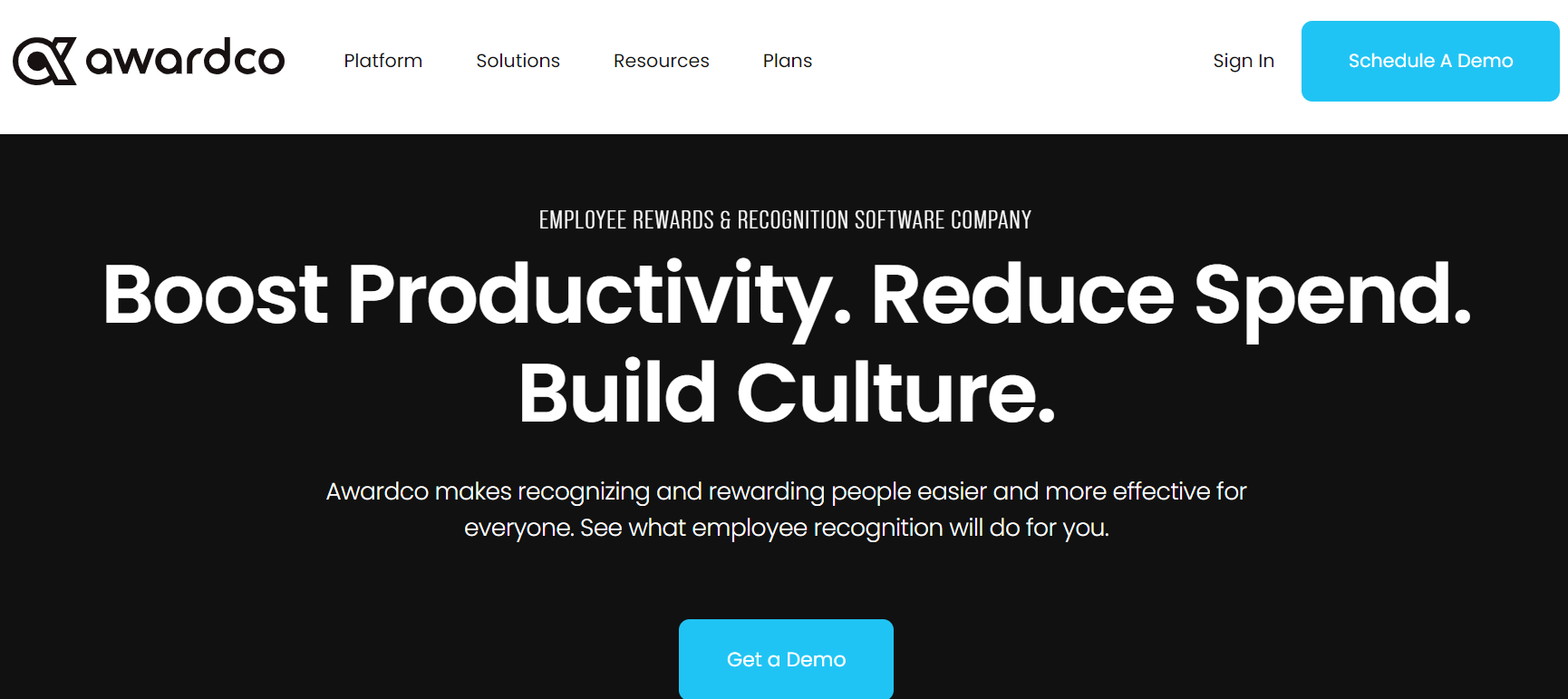
Awardco is a great employee experience platform designed to streamline and enhance employee recognition efforts within organizations. The company
Key features
- Extensive rewards: Awardco provides an expansive reward catalog, allowing employees to choose personalized rewards for their achievements.
- Real-time recognition: Immediate acknowledgment of employee accomplishments ensures timely and relevant appreciation.
- E-commerce integration: Seamless integration with major e-commerce platforms (such as Amazon Business) simplifies reward redemption.
- Peer-to-peer and manager-to-employee recognition: Facilitates recognition exchanges across the organization.
- Custom Integrations via API: Allows tailored integrations with other tools or systems.
Pros
- Broad reward options: The vast selection of reward redemption options, including e-gift cards, events, swag, and custom catalogs, enhances user satisfaction.
- Integration with e-commerce giants: Awardco’s seamless integration with e-commerce platforms like Amazon Business ensures a smooth redemption process.
G2 rating – 4.8 / 5
Free trail – Not available
3. 15five
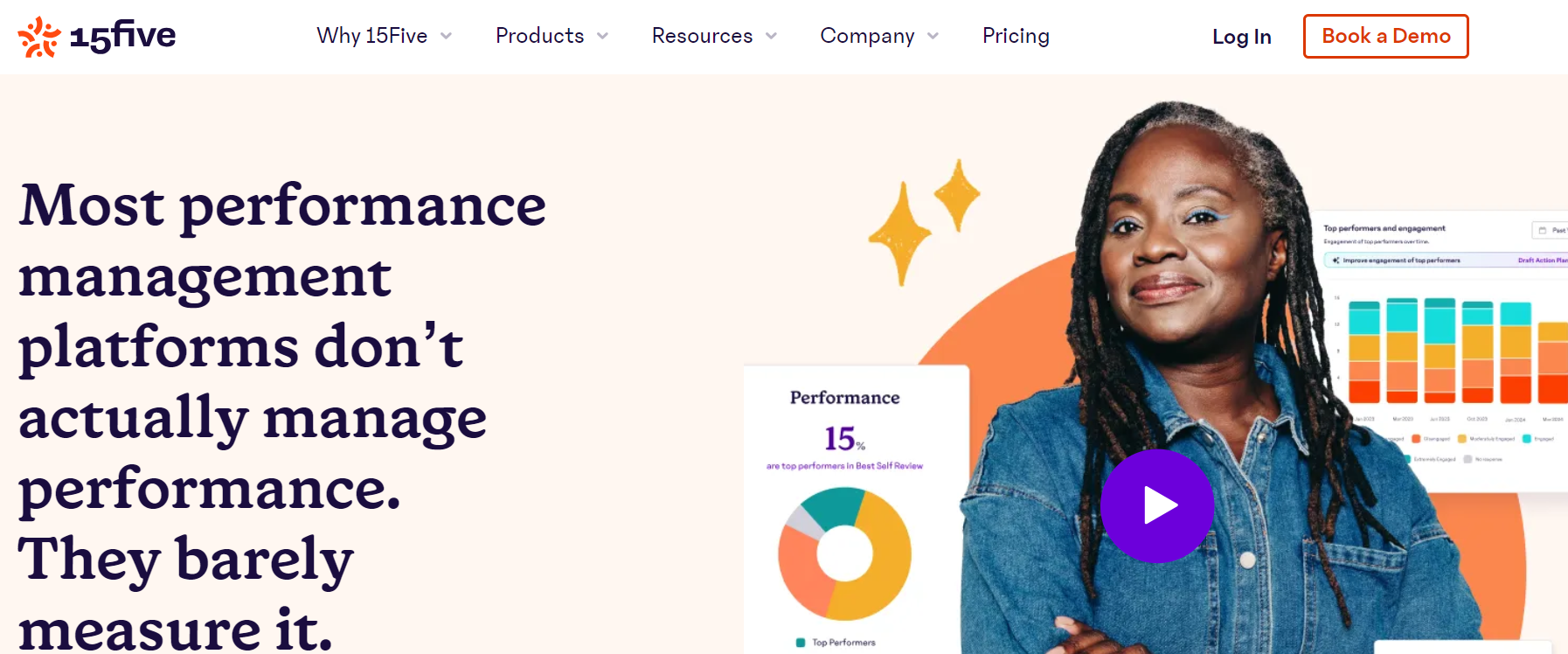
15Five is a strategic performance management platform designed to enhance employee engagement, performance, and retention. Here’s an overview:
Key features:
- 360° performance reviews: Enables comprehensive feedback from peers, managers, and self-assessment.
- Engagement surveys: Collects insights on employee satisfaction and engagement.
- Goal tracking: Helps set, monitor, and achieve individual and team goals.
- Guided 1-on-1s and check-ins: Facilitates ongoing feedback and development conversations.
- Generative AI and custom analytics: Enhances data-driven decision-making.
Pros:
- Visibility: Provides transparency into employee performance.
- Effective employee management: Supports constant communication with the employer.
G2 Rating: 4.6/5
Free Trial: 15Five offers a free trial for users to explore its features
4. Fond
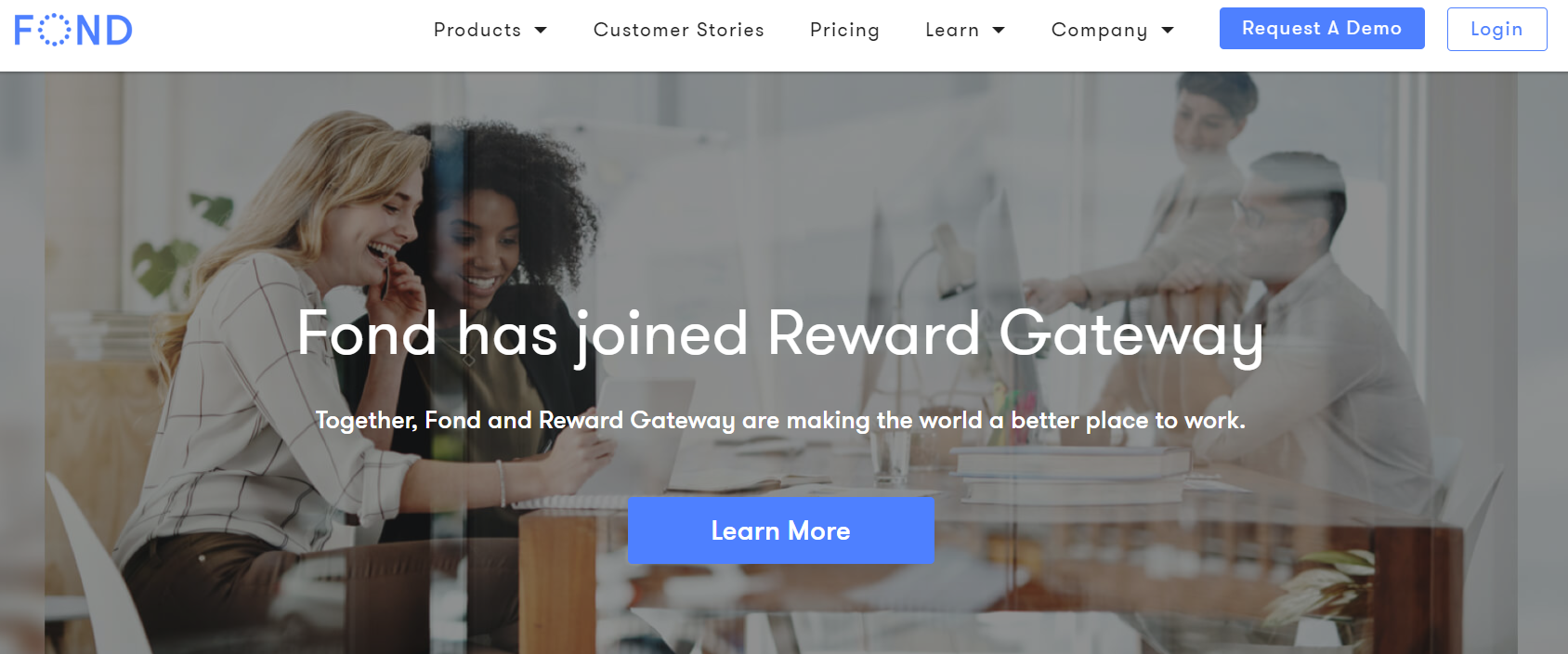
Fond boosts employee morale and engagement by offering recognition and rewards. Employees can publicly celebrate each other's achievements, building a positive and supportive work environment; helping enhance overall employee experience. The platform keeps track of important milestones like service awards and anniversaries.
Key features
- Extensive rewards: Fond offers a wide range of reward options, including e-gift cards, events, and custom catalogs.
- Integration with e-commerce platforms: Seamless integration with platforms like Amazon Business simplifies reward redemption.
- Peer-to-peer recognition: Employees can recognize and appreciate their colleagues.
Pros
- Users appreciate the user-friendly platform.
- The company fosters a culture of continuous improvement through personalized development plans and actionable insights.
G2 rating – Not available
Free trail – Not available
5. Qualtrics
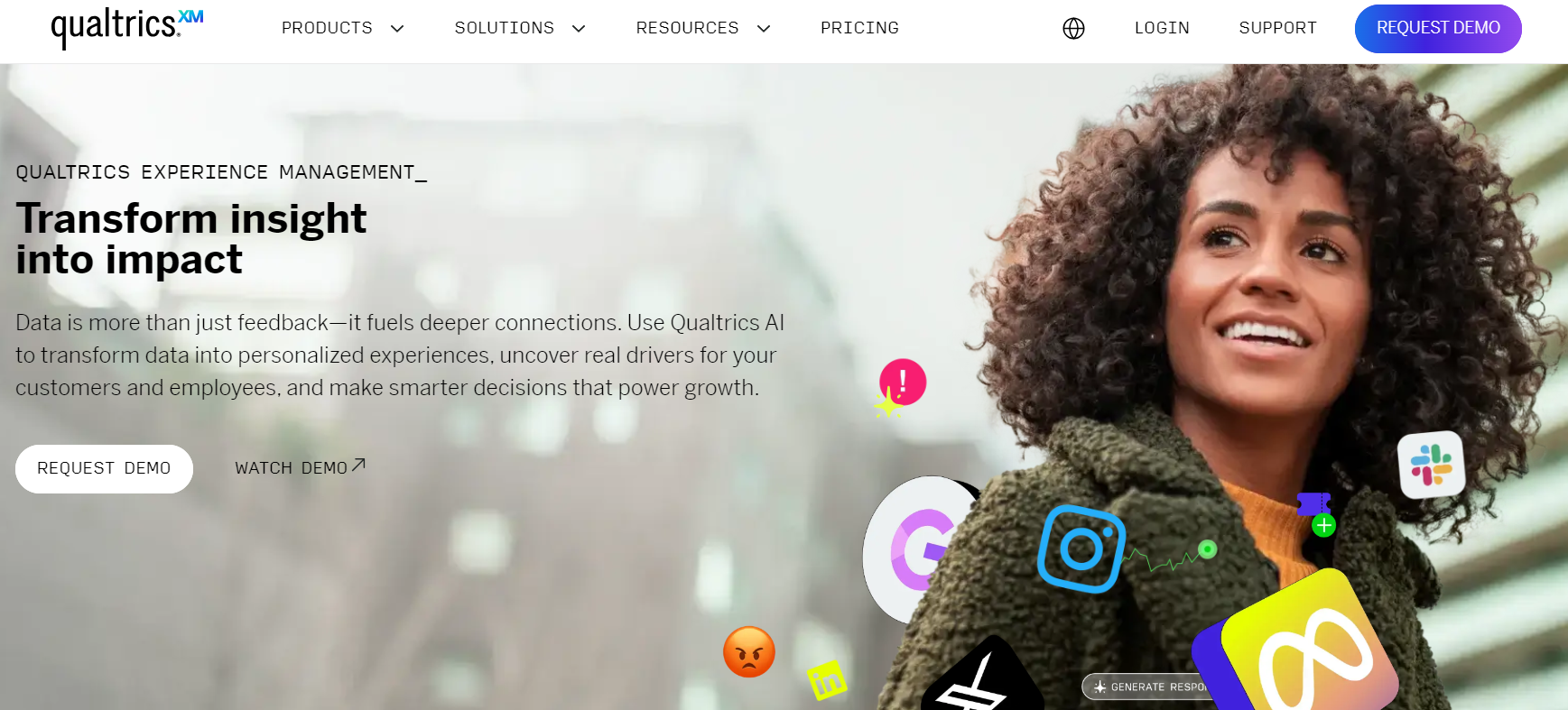
Qualtrics offers a specialized employee experience platform built for HR teams. It uses smarts (AI) and automation to constantly collect and analyze employee feedback throughout their entire journey with the company. This allows you to understand your employees' perspectives at every stage.
Qualtrics goes beyond just gathering feedback. Their data analysis tools can connect employee sentiment to how it impacts customer experience and overall business results. This lets you focus your employee experience improvements on the areas with the biggest potential payoff.
Key features
- 360° feedback: Enables comprehensive feedback from peers, managers, and self-assessment.
- Employee surveys: Collects insights on engagement, well-being, and intent to stay.
- Manager assist: Helps managers keep teams engaged and productive.
Pros:
- Actionable insights: Qualtrics provides relevant, easy-to-understand insights for HR and leaders.
- Holistic approach: Measures inclusion, well-being, and intent to stay alongside engagement.
G2 rating – 4.5/5
Free trail – Not available
6. Bonusly
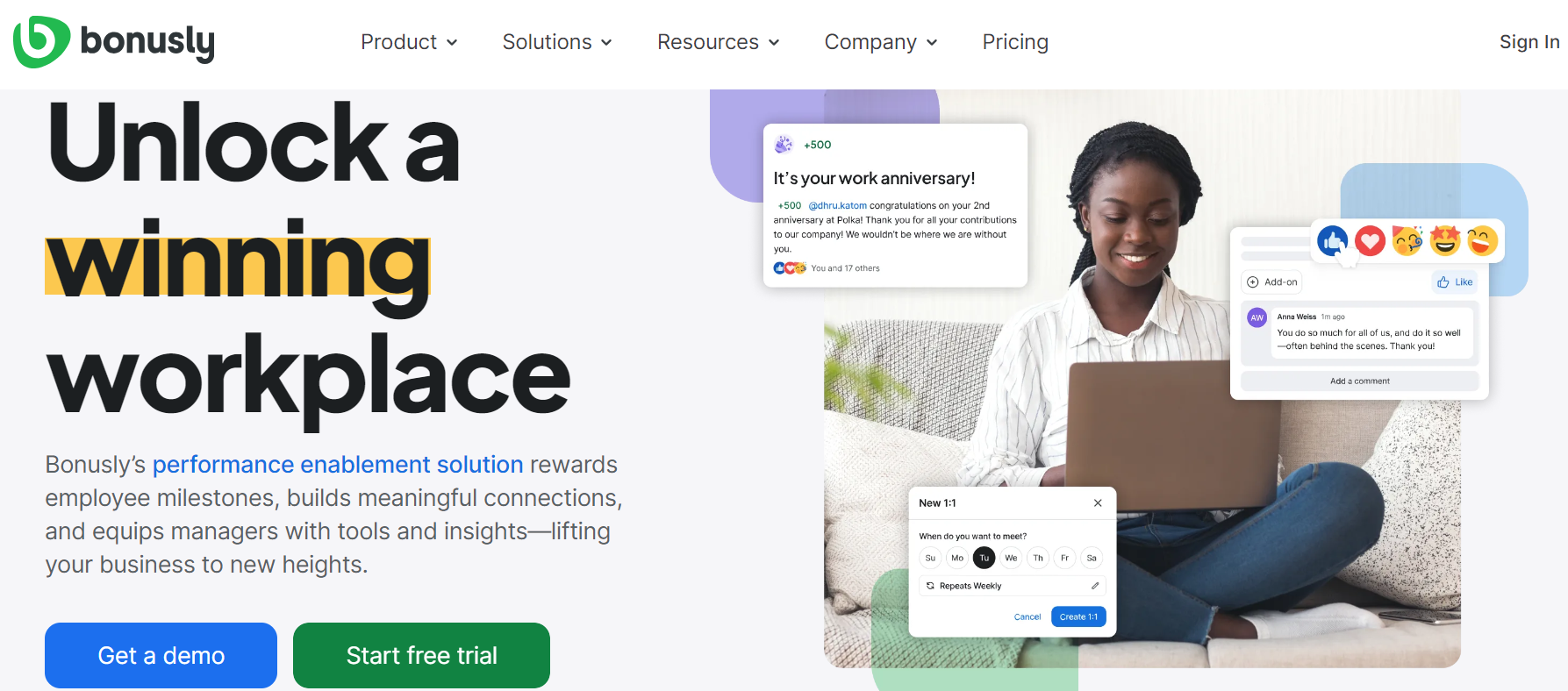
Bonusly is a powerful employee experience solution focused on peer-to-peer recognition and rewards.
The platform allows employees to set personalized goals and earn points for achieving them. These points can then be redeemed for a variety of rewards, all within the platform.
Features:
- Peer-to-peer recognition: The organization allows employees to give and receive recognition from their peers for outstanding work or simply going the extra mile.
- Automated rewards programs: Help set up automated rewards programs so that employees are automatically rewarded for achieving certain goals or milestones.
- Manager analytics: Managers can use analytics to track employee recognition activity and see how it is impacting team morale and performance.
Pros:
- Can create a more engaged workforce: By recognizing and rewarding employees for their contributions, the firm can help to create a more engaged and motivated workforce.
- Easy to use: The company offers a user-friendly platform that is easy for employees and managers to use.
G2 rating – 4.7/5
Free trail – 14-day free trail
7. Motivosity
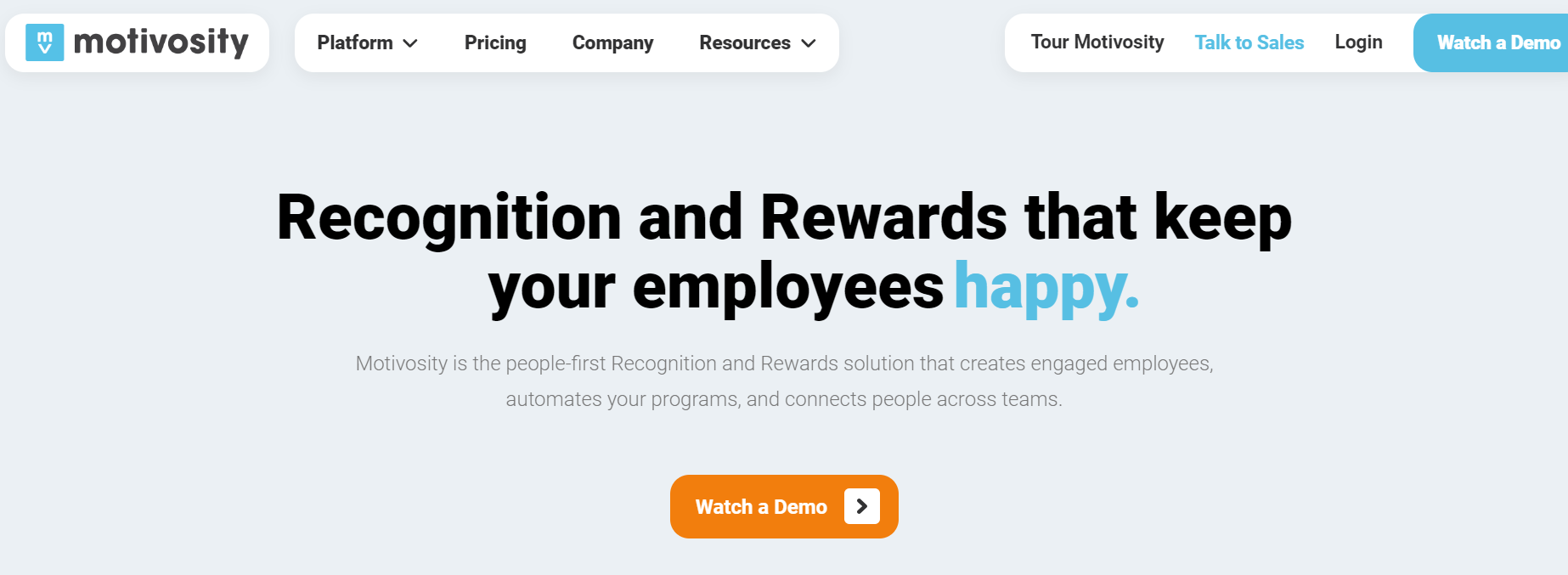
Motivosity is an employee experience solution designed to cultivate a culture of appreciation and recognition in your workplace. This cloud-based platform uses social features, recognition programs, and employee sentiment surveys to boost morale and well-being.
The organization goes beyond traditional recognition methods by offering features like peer-to-peer recognition, social appreciation feeds, and gamified rewards. This multi-faceted approach aims to create a more positive and productive work environment for your employees.
Features:
- Social recognition: Provides a social feed where employees can appreciate each other's work publicly.
- Sending public recognition: Allows for sending public recognition messages to acknowledge employee achievements.
- Employee sentiment surveys: Offers surveys to measure employee sentiment and understand their overall well-being.
- Mobile app: Provides a mobile app for convenient access to the platform's features.
- Integrations: Integrates with other software programs, making it easier to use alongside existing tools.
Pros
- Improved employee experience: The company contributes to a more positive employee experience by fostering a culture of recognition and appreciation.
- Increased employee well-being: By promoting gratitude and recognition, the employee experience can have a positive impact on employee mental health.
- Feeling valued: The platform allows employees to feel heard and acknowledged for their contributions.
Cons:
- Not an HRIS or payroll system: It's important to note that Motivosity is not a replacement for HRIS or payroll systems.
G2 rating – 4.8 / 5
Free trail – Not available
8. Leapsome
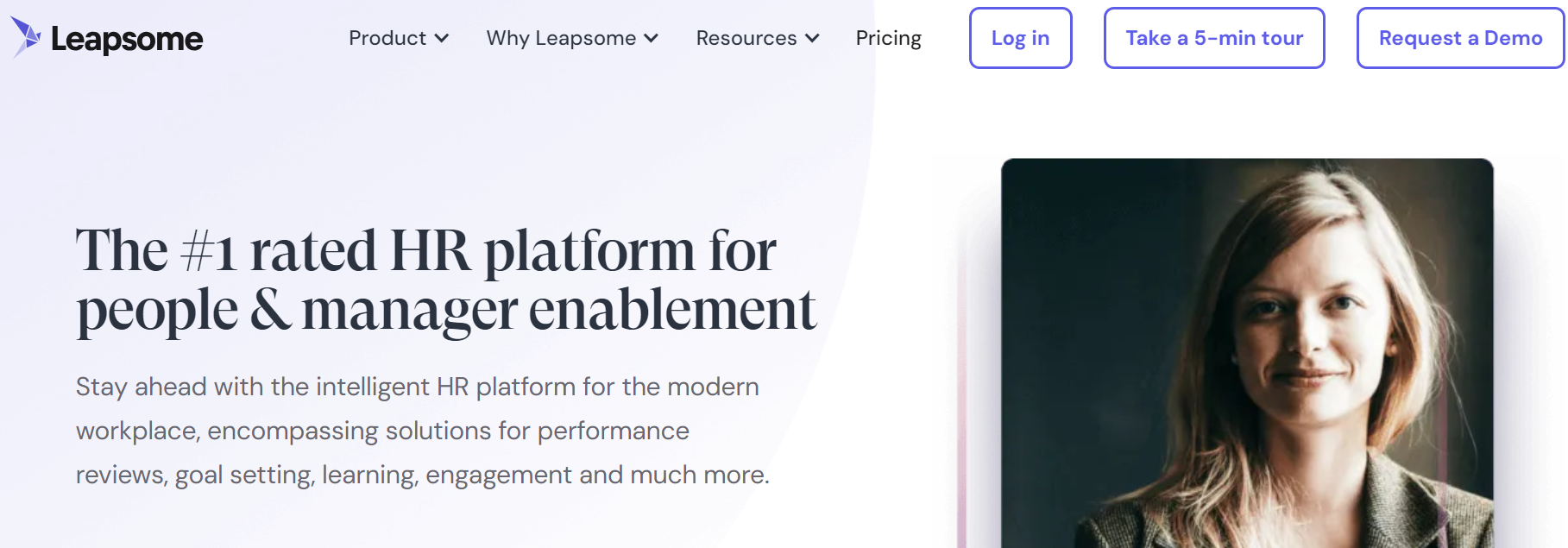
Leapsome offers a suite of features designed to nurture a positive work environment, improve communication, and empower both employees and managers.
Key features
- Performance management: The company offers features for performance reviews, goal setting, OKRs, and feedback and praise. This allows managers and employees to have regular conversations about performance and development.
- Employee engagement: The digital employee experience platform includes tools for 1:1 meetings, engagement surveys, and a competency framework. These features can help to improve communication between managers and employees, and help employees feel more connected to their work.
- Learning and development: The company offers a learning management system that can be used to deliver training and development programs to employees.
Pros
- Easy to use and intuitive: The platform is designed to be easy for both managers and employees to use.
- Improved communication and feedback: The company offers features that can help to improve communication and feedback between managers and employees.
- Automated HR processes: Help to automate some HR processes, such as performance reviews and goal setting.
- Strong customer satisfaction: The company has a strong customer satisfaction rating and is trusted by a number of leading companies.
G2 rating – 4.8 / 5
Free Trail – Available
Employee experience is a hill to die on
If you treat your employees right, they will swear by you till the kingdom come! Don’t cut corners when choosing a good experience platform, and you will be rewarded with higher revenues, improved productivity, an increase in eSAT, and low employee turnover. Happy employees mean a flourishing business, so choose wisely.
Employee experience solutions are revolutionizing the way companies approach workplace culture and employee engagement. These eight employee experience platforms mentioned in the blog offer a range of features designed to improve communication, recognition, performance management, and overall employee well-being.


















